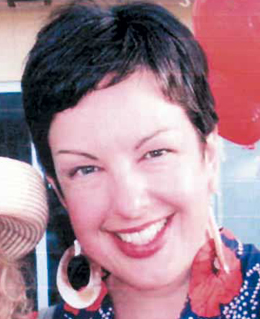Assistant Professor Launches Radio Program on Indigenous Politics
| Posted 03/02/07 |
 A new WESU 88.1 FM radio program is gaining a nation-wide audience with its emphasis on indigenous politics. A new WESU 88.1 FM radio program is gaining a nation-wide audience with its emphasis on indigenous politics.
The show, titled ”Indigenous Politics: From Native New England and Beyond,” was launched Feb. 5 from the Wesleyan-based radio station. J. Kehaulani Kauanui, assistant professor of anthropology and American Studies, is the producer and host of the program. The multi-media program airs shortly after 5p.m., right after the Jive at Five community calendar, and runs until 6 p.m. each Monday with a live streaming Web cast on www.wesufm.org. ”Indigenous Politics” features interviews with political leaders, community activists, filmmakers and artists, and cultural authorities, as well as academic scholars whose work addresses cultural politics and sovereignty struggles. Kauanui, a Native Hawaiian, says most guest speakers are indigenous or local to Connecticut and the New England area. She opens her show saying We are here in Middletown, Connecticut, also known as Mattabessettthe traditional homeland of the Wangunk tribe. I really want to privilege the voices of Native New England, Kauanui says. The show is also Native New England and beyond but, first and foremost, I think we need to educate local listeners of the struggle going on right here. Kauanuis first show featured an in-depth interview with Suzan Shown Harjo, Cheyenne/Hodulgee Muscogee and a poet, writer and policy advocate who has helped Native peoples recover more than 1 million acres of land. The second program featured Richard Velky, leader of the Kent, Conn.-based Schaghticoke Tribal Nation since 1987, who discussed his tribes legal battle in response to the Bureau of Indian Affairs reversal of their federal acknowledgement after state officials intervened. The follow week, Kauanui interviewed Randolph Lewis, assistant professor of American Studies at the University of Oklahoma, who discussed his new book, Alanis Obomsawin: The Vision of a Native Filmmaker. Kauanui hopes to include future shows on Hawaiians and the politics of federal recognition; Native feminisms; same-sex marriage bans in Indian country; indigenous environmental issues; U.S. militarism and indigenous peoples’ service; domestic violence and restorative justice; indigenous language revitalization; sports teams and Indian mascots; the U.S. presidential election and American Indian voters; indigenous peoples and the prison industrial complex; contemporary land rights; Indian gaming and the politics of casinos; and indigenous youth movements. Ben Michael, WESU 88.1 general manager, expects Kauanuis new show to be a national success. Already, WESU transmits to sections of Connecticut, Massachusetts and the Long Island area of New York. But, since the scope of Kauanuis program is regional and national, Michael hopes to eventually syndicate it nationally through the stations affiliation with Pacifica Radio. This would create a potential audience of millions of people. WESU has a mission to serve as a resource for underserved communities by providing access the radio airwaves for mass communication. Kehaulanis program accomplishes this in an educational and professional format, Michael says. Its very fulfilling to see WESU being utilized in such positive and effective manner. This is why community radio exists and is such an asset. Kauanui was tapped for the radio program by Ken Weiner, the station’s public affairs director. Like any other student or community volunteer wanting to be an on-air host, she took a six-week training course. In addition, she completed two internships and community service hours before taking a practical and written exam on the station. Kauanui said she is motivated by several key issues affecting nations across the country, most notably the fact that many tribes do not have ”basic” federal recognition. Historically, she explains, recognition differed between state-recognized tribes from the original 13 colonies and the ‘treaty tribes’ in the Western states. More recently, the backlash against casino development has been instrumental in the opposition to federal recognition. The conflation of federal recognition with the specter of Indian casinos indicates that most non-tribal residents in these states refuse to uncouple questions of tribal economic development – a question of a nation’s political economy – and the social justice issue of honoring the U.S. trust doctrine,” Kauanui says. The 21st century’s ”most notorious cases” involve two Connecticut tribes – the Eastern Pequot and Schaghticoke tribal nations, Kauanui says. In addition to hosting the radio show, Kauanui is teaching two courses this year, US in the Pacific Islands, and Methodologies in Ethnic Studies, and is continuing her research on white settler colonialism and indigenous self-determination. She is currently co-editing a book with Andrea Smith, Native Feminisms: Without Apology, and embarking on two new book monograph projects: one on Native Hawaiian feminist decolonization and the other on Hawaiians in New England in the early 19th century. Her first book, Long Division: Genealogy, Hawaiian Blood Quantum, and the Question of Sovereignty is forthcoming from Duke University Press in 2007. Her radio program has already had mentions in Hawaiian Independence Blog, Arizona Native Net, and Indian Country Today, an American Indian news source based in Canastota, N.Y. Kalia Lydgate 07, Raffi Stern 08, Liz Love `07, and Amelia Dean Walker 07 help Kauanui produce the show. |
| By Olivia Drake, Wesleyan Connection editor. Segments of this article were adapted from a Feb. 19 article titled Native Radio/Web Program Launched by Indian Country Today writer Gale Courey Toensing. |

